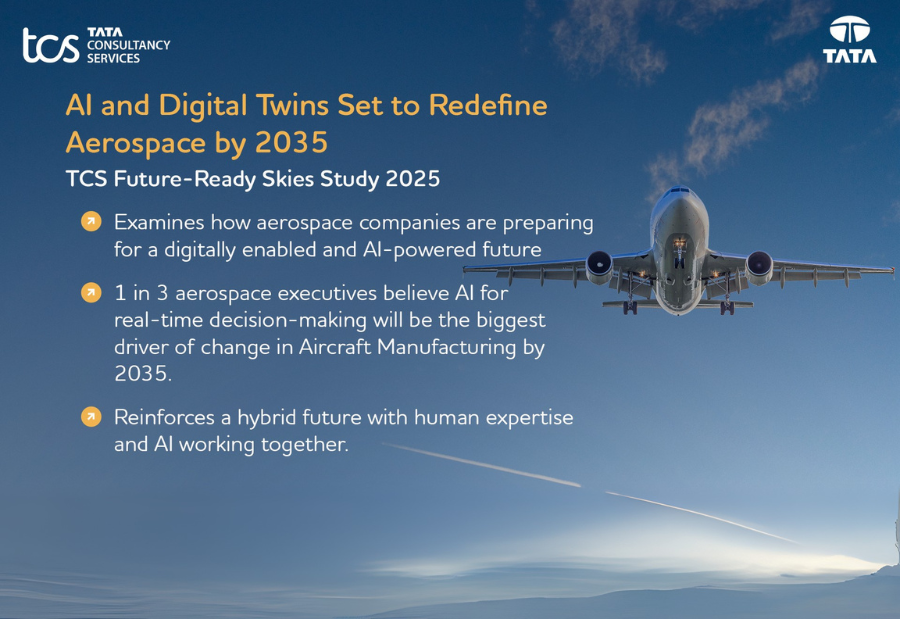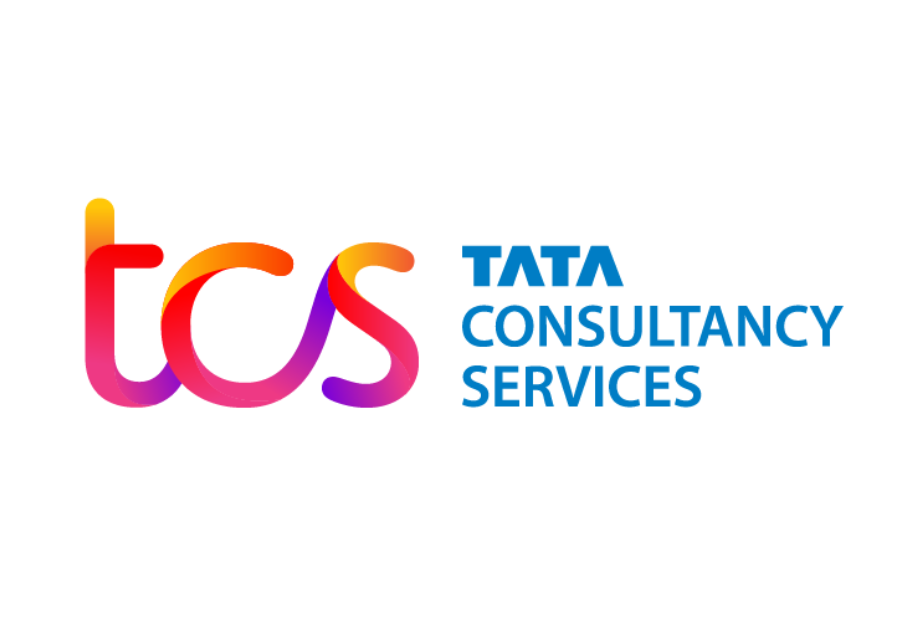The TCS Future-Ready Skies Study 2025 reveals that 60% of aerospace leaders say human expertise will remain critical in an AI-driven manufacturing future
Nearly two-thirds of aerospace respondents are open to allowing Agentic AI to operate their supply chains
A new study by Tata Consultancy Services , a global leader in IT services, consulting, and business solutions, reveals that 1 in 3 aerospace executives believe artificial intelligence (AI) for real-time decision-making will be the biggest driver of change in aircraft manufacturing by 2035. The TCS Future-Ready Skies Study 2025 examines how aerospace companies are preparing for a digitally enabled and AI-powered future across manufacturing, maintenance, mobility, and supply chains.
The report captures an industry in transition, with companies increasingly investing in intelligent, sustainable operations. It highlights how manufacturers expect human involvement to remain essential in 60% of their production processes, on average, reinforcing a hybrid future where human expertise and AI work together. While AI leads the charge, aerospace executives also identified digital twins and robotics as the key enablers for transformation. The study surveyed over 323 senior aerospace executives, including aerospace manufacturers, Advanced Air Mobility (AAM) companies and Manufacturing, Repair and Overhaul (MRO) providers, and electric vertical takeoff and landing (eVTOL) companies across Europe and North America. With the aerospace market projected to surpass $1 trillion by 2030, and the MRO segment alone expected to reach $137 billion, the study offers a crucial pulse check on where the industry stands and a look into the future. It also aligns with key developments such as the anticipated certification of eVTOL aircraft and the increasing regulatory and operational complexity across global supply chains.
Steve Lucas, Chairman and CEO, Boomi, said, “The Future-Ready Skies Study shows that the aerospace industry is at an inflection point where the promise of AI depends on getting the fundamentals right. Change only happens, however, at the speed of trust and that trust begins with data. Agentic AI can only succeed when it’s built on a strong foundation of connected, reliable data. By integrating and connecting everything across their complex ecosystems, companies can accelerate decisions, scale innovation, and turn complexity into a true competitive advantage.”
Key takeaways from the survey:
* A striking 63% of aerospace executives are open to adopting agentic AI to manage supply chains, but only 6% currently do so, underscoring both readiness and the innovation gap.
* On average, respondents anticipate only 40% of their manufacturing operations to be lights out (a manufacturing process that uses a high level of automation), requiring minimal human intervention, within the next 5-7 years.
* Over half (51%) of MRO providers, on average, anticipate a return on investment in advanced technology in five years or sooner, with nearly two-thirds (64%) expecting predictive analytics and agentic AI to deliver measurable ROI in that same timeframe.
* Only a third (34%) of AAM companies cited “public acceptance” as an obstacle to such services as urban air taxis; in fact, 70% are already building commercial platforms, reflecting industry momentum.
* Just 5% of MRO executives say their digital MRO strategy is already sufficiently scaled for the industry’s next phase. For the rest, 80% anticipate a negative impact from rising operational costs, increased downtime, revenue, and customer churn if their digital MRO strategies fail to scale in the next three years.
* Digital thread integration is underway, with 59% of manufacturers reporting at least partial implementation, though full lifecycle integration remains elusive.
Anupam Singhal, President, Manufacturing, TCS, said, “The aerospace industry has always been one where ambition is matched by precision and safety. Today, ambition is redefined as AI moves from supporting operations to shaping enterprise strategy—advancing passenger experience, safety, and sustainability. At TCS, we see this as a leadership opportunity to help aerospace enterprises build resilient, adaptive ecosystems and shape skies that are bold, transformative, and future-defining.”
As more organizations invest in foundational capabilities, the stage is set for greater real-time decision intelligence and operational transparency across the value chain. A critical finding is that less than a third (28%) of aerospace firms say they could pivot sourcing within 30 days of a Tier-1 disruption, exposing the fragility of today’s supply chains. In the MRO segment, leaders are beginning to lay the groundwork for advanced automation. However, only 2% of the surveyed leaders anticipate having fully autonomous processes – from detection to repair decisions – by 2030. In the fast-growing Advanced Air Mobility sector, including electric aircraft, 70% of surveyed companies are actively building commercial platforms, reflecting a clear industry commitment to next-generation mobility. While challenges around regulation, economics, and infrastructure remain, these barriers are being steadily addressed as the sector advances toward broader adoption. Crucially, the momentum around digital transformation is translating into measurable expectations, 32% of aerospace leaders anticipate RoI on MRO technologies within three years, and 80% acknowledge that accelerating digital adoption is vital to reducing future risks and inefficiencies. This growing alignment between investment and impact points to a sector that is preparing not just to evolve—but to lead with intelligence, agility, and resilience.
With multiple decades of experience, TCS is a trusted partner across the aerospace and defence value chain—supporting OEMs, tier suppliers, airlines, airports, and MROs. TCS’ end-to-end capabilities span consulting, engineering, IT modernization, and digital solutions, driving innovation across the product lifecycle and enabling enterprises to stay perpetually ready for the future. With three decades of leadership in aviation, TCS partners with the world’s leading airlines, offering consulting-led innovation, cognitive-powered portfolio of business, and technology and engineering services. TCS leverages industry-specific solutions, like TCS Aviana™, a unified, autonomous, digital, cloud-ready solution for intelligent airline operations.
Also read: Viksit Workforce for a Viksit Bharat
Do Follow: The Mainstream formerly known as CIO News LinkedIn Account | The Mainstream formerly known as CIO News Facebook | The Mainstream formerly known as CIO News Youtube | The Mainstream formerly known as CIO News Twitter |The Mainstream formerly known as CIO News Whatsapp Channel | The Mainstream formerly known as CIO News Instagram
About us:
The Mainstream formerly known as CIO News is a premier platform dedicated to delivering latest news, updates, and insights from the tech industry. With its strong foundation of intellectual property and thought leadership, the platform is well-positioned to stay ahead of the curve and lead conversations about how technology shapes our world. From its early days as CIO News to its rebranding as The Mainstream on November 28, 2024, it has been expanding its global reach, targeting key markets in the Middle East & Africa, ASEAN, the USA, and the UK. The Mainstream is a vision to put technology at the center of every conversation, inspiring professionals and organizations to embrace the future of tech.




